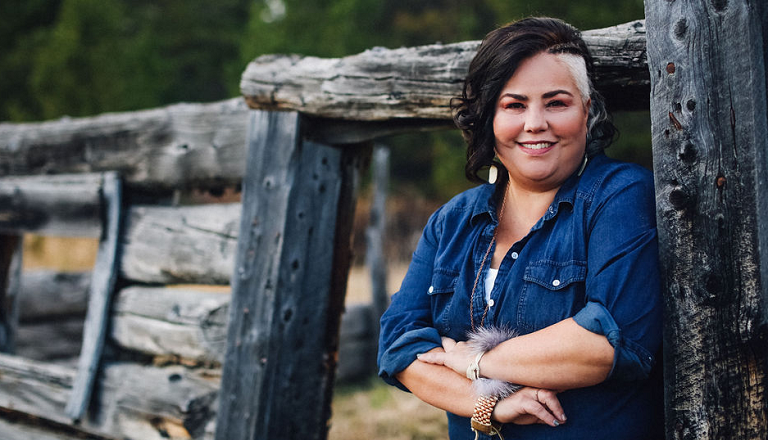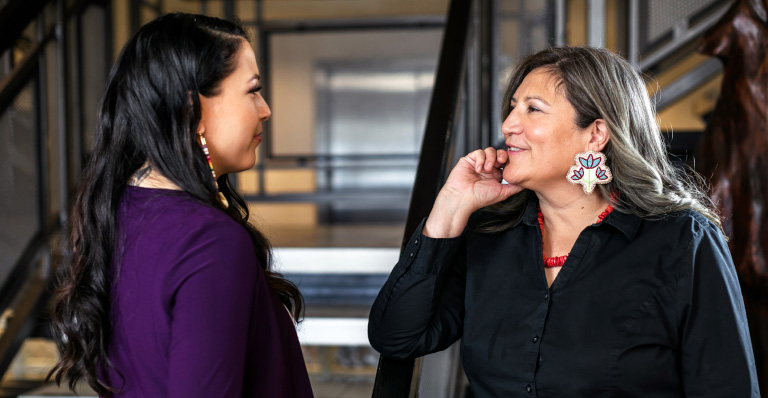
National network empowers women-owned businesses to succeed in retail
Author details
Jennifer Topping
Principal, Market Research
As a senior business advisor for small- and medium-sized enterprises (SMEs) at a major bank several years ago, Ejibola Adetokunbo-Taiwo was pitched many business ideas, heard all the grand plans and fielded countless requests for financing.
Clients at her branch in Grande Prairie, AB, came to scale up, open new stores, add more inventory, hire new people, train staff and even expand overseas. But there was one thing Adetokunbo-Taiwo didn’t often encounter: Women-owned businesses looking for help.
“They never came to the bank. There were men coming for help, seeking funding and financing, but women never did. I would call on women clients and they would say they were fine, but how could they be?” says the founder of de Sedulous Women Leaders, a national network of women professionals and entrepreneurs whose aim is to support and empower Black, racialized and immigrant women-owned businesses.

Curious to understand what women business owners experienced from the other side of the banker’s desk, Adetokunbo-Taiwo created a business plan for her own small startup and walked her loan application across the street to a competing bank. The business advisor there took one quick look at her cover page and company name and flatly told Adetokunbo-Taiwo her business would never succeed.
Surprised at the instant dismissal, she placed her business card and bank name tag on the advisor’s desk and immediately voiced her disappointment: “It’s interesting that you conclude that without looking at my business plan. I’m shocked at the service I’ve received here today.”
The meeting changed the course of Adetokunbo-Taiwo’s life’s work. Soon after, she switched jobs and became entrepreneurship co-ordinator for the Grande Prairie Regional Innovation Network (GPRIN) and entrepreneur-in-residence at Northwestern Polytechnic (formerly known as Grande Prairie Regional College).
Rattled after experiencing what racialized women entrepreneurs were facing, she has since used her knowledge and network to form de Sedulous Women Leaders. Her mission is to bring visibility to Black, racialized and immigrant women entrepreneurs and ensure they can contribute to the economy by getting the support they need to scale up.
One way de Sedulous Women Leaders is contributing to entrepreneurial success is through their Retail Entrepreneurship Acceleration Program (REAP), which equips immigrant women, women of colour, and Black Canadian women entrepreneurs with the tools to get their products onto retail shelves through incubators and hands-on mentorship and coaching. REAP operates in conjunction with iLaunchHERproduct, a year-long program that connects entrepreneurs with big-box store buyers and other retail outlets.
You should also check out
EDC Women in Trade guide offers insights to help Canadian women-owned businesses succeed internationally
In partnership with Export Development Canada (EDC), Business Development Bank of Canada (BDC), WEConnect International, TD Bank, Canadian Trade Commissioner Service (TCS) and the Women Entrepreneurship Knowledge Hub (WEKH), iLaunchHERproduct helps women position their products on high-volume retail shelves and ensures a diversity of products, including where they’re produced and by whom.
EDC recently supported a research project capturing data from iLaunchHERproduct applicants to help de Sedulous Women Leaders better understand the needs and barriers Black, racialized and immigrant business women face within the retail ecosystem.
The Survey on Financing and Growth of Small and Medium Enterprises Research from Innovation, Science and Economic Development Canada* (ISED) has shown that Black, racialized, and immigrant women-owned businesses make important contributions to the Canadian economy. In fact, 28.7% of SMEs are immigrant-owned and 16.8% are majority women-owned. In EDC’s report, A deep dive into the racialized, Black and immigrant women-owned business applicants, data from the iLaunchHERproduct helps to understand the drivers behind those businesses.
For example, of the 157 businesses that applied for the program, 92% were Black-owned, 83% were run by racialized owners and 78% were immigrant women-owned. Overall, 38% of the businesses started during the COVID-19 pandemic. Even more interesting were the reasons these women formed their businesses in the first place:
- 36% of the cohorts wanted to empower a community or focus on self-care;
- 27% launched a business to address a specific need in their community; and
- 27% wanted to focus on natural or sustainable products.
You should also check out
Learn how you can attract international buyers to grow your business globally.
While the women who responded to the survey identified myriad hurdles and obstacles, including finding suppliers and customers, and knowing who to turn to for sound and reliable advice, 83% said obtaining financing was their No. 1 challenge. Several key insights from the report also shed light on how small- to medium-sized, women-owned businesses could scale up and even become export-ready:
Get incorporated
Around 89% of SMEs in Canada are incorporated, compared to just 52% of the iLaunchHERproduct applicants. Yet incorporating is often a clear path to business growth. While sole proprietorship is easy and low-cost to set up, it comes with greater liability and a higher tax rate. Incorporated companies can get easier access to financial resources, receive a lower corporate tax rate and have better asset protection. Learn about how to incorporate in Canada here.
Establish a financial entity
Most kitchen table companies are backed by personal financing under the owner’s name. But to establish credit, a financial history and bank credibility, it’s critical to set up a business as its own financial entity, with a business bank account, credit card and/or line of credit.
Get business certifications
Of the applicants surveyed, the most successful in the retail space held appropriate certifications to help identify and promote their business. They include Women Business Enterprises Canada (WBE), Made in Canada and Canadian Aboriginal and Minority Supplier Council (CAMSC). Other relevant certifications entrepreneurs can obtain are Global Standard 1 (GS1) for standards in business communications such as barcodes, Canadian Food Inspection Agency, Food Handler Certificate and Children’s Product Certificate.

Plan for challenges
Respondents identified several key challenges: Getting financing, finding partners or distributors, identifying new markets, facing stiff competition, creating a business strategy, shipping logistics and supply chain management, amongst others. Women in business can get guidance, support and growth through resources, like iLaunchHERproduct, de Sedulous Women Leaders and organizations such as WEKH, Coralus (formerly SheEO), BDC, and the TCS.
Use resources as a tool for growth
Building a support network of fellow business owners and knowledge partners and exploring email marketing or digital apps, like TikTok, Instagram and Facebook, to identify your audience and showcase a business to retailers were identified as key steps for growth. So, too, is the strategy of using business financing and grants as tools to scale. Highly successful women-owned businesses in the survey also leveraged guidance from within their ecosystem to trigger new opportunities.
Consider international diversification
In Canada, women-owned businesses represent more than $117 million in economic activity, yet there’s only a small—around 11%— expanding group of women-owned businesses conducting trade internationally. Of the iLaunchHERproduct survey, 12% of women-owned business applicants were selling indirectly and 12% were selling directly outside of Canada. For these SMEs, exporting led to larger economies of scale and bigger sales of more than $50,000 annually. Moving onto the world stage means accessing bigger pools of capital, building robust networks and tapping the right trade partners. But for those women-led businesses that are ready to export or interested in global trade, EDC offers significant resources, programs, tools, insight specific to Women in Trade and financing solutions.
Beyond the report
For Adetokunbo-Taiwo, having EDC’s expertise in collating and writing the de Sedulous Women report has done more than shed light on the status of Black, racialized and immigrant women-owned businesses in Canada.
“It’s validation of the programs we offer, from my perspective. After one season, we’re seeing success from iLaunchHERproduct: Participants are getting their products into Winners, Marshalls, Hudson’s Bay, Sodexo, Walmart, Costco e-commerce.
“Having EDC involved is a huge impact in telling this story. Not only can we hone our own story, but we have a partner who can back us up and say, ‘We’re on this journey with de Sedulous Women. These are the challenges ahead.’ This report is a benchmark,” she says.
To register for Season 2 of iLaunchHERproduct, click here.
Statistically speaking
- 132,620 women are majority owners in small and medium enterprises in Canada, earning $30,000 a year or more
- Of the iLaunchHERproduct applicants:
- 25% already had a retail presence
- 27% had tried
- 48% hadn’t tried
- 54% of applicants were in business between one and four years while 38% had been operational less than a year
- Of 157 applicants, 100 earned less than $25,000 from their enterprise; two were earning more than $500,000 annually
- 26% of the businesses were focused on beauty and skin care, 24% in food and beverage, 12% in fashion and accessories and 8% in books and stationery
Top 3 challenges identified
- Obtaining financing (83%)
- Identifying partners or suppliers (78%)
- Finding new customers (76%)
*Immigrant-led SME exporters in Canada, Global Affairs Canada
You should also check out
Indigenous entrepreneur puts community front and centre
A look at the trends and individuals driving growth and innovation for Indigenous businesses.





















